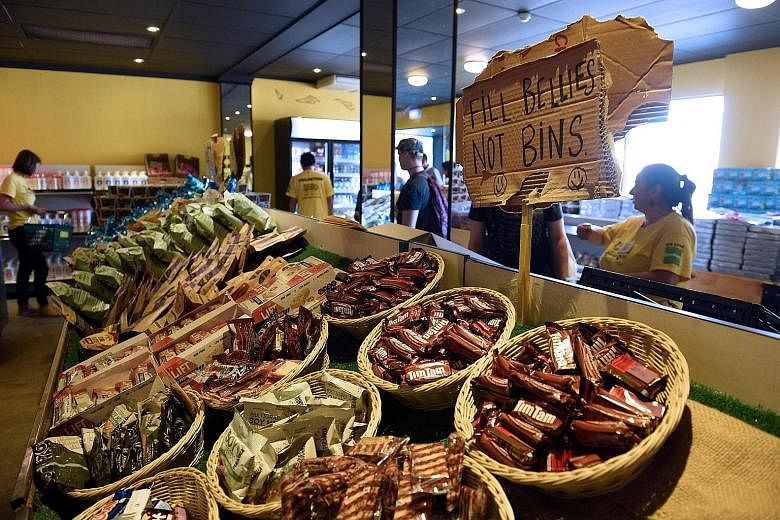SYDNEY • Australia's first recycled food supermarket is giving items destined for landfills a second chance, as the government embarks on a major push to cut down on waste that is costing its economy A$20 billion (S$21 billion) a year.
The outlet run by food rescue organisation OzHarvest in Sydney takes surplus products normally thrown out by major supermarkets, airlines and other suppliers, and gives them away for free.
It is an attempt to tackle the mounting waste problem in Australia, home to 24 million people, where consumers toss out some 20 per cent of the food they buy, with more than four million tonnes ending up as rubbish each year.
"It is simply remarkable that, in prosperous, modern-day Australia, we produce enough food to feed 60 million people a year but, every month, more than 600,000 people - one-third of them children - seek food relief from relevant charities," Environment Minister Josh Frydenberg said in April.
The government is drawing up an ambitious plan to halve food waste by 2030, and is convening a national summit later this year that will involve the private sector and non-profit organisations.
Globally, a third of food produced for humans - about 1.3 billion tonnes costing around US$1 trillion (S$1.4 trillion) - is lost or wasted annually, according to the Food and Agriculture Organisation of the United Nations.
Such wastage is particularly conspicuous in retail, where "large quantities" of food are thrown away because of "quality standards that over-emphasise appearance", added the UN body.
What we eat or throw away is just the tip of the iceberg in the production process, say conservation experts, because huge amounts of resources such as fertilisers, fuel, land and water are used to grow and package food.
"When food's wasted, and all of those resources are wasted as well, what's incumbent upon us is to make the most of the food that we produce in those instances, rather than producing more and more," said chief executive Marcus Godinho of charity FareShare.
FareShare tackles waste by cooking large quantities of food that farmers and manufacturers struggle to offload, or that is due to expire, at a 500 sq m kitchen in Melbourne. The food is then frozen and stored for distribution to the disadvantaged at a later date.
Also working to reduce waste at a wholesale level is Yume, an online platform that connects suppliers and buyers for hard-to-sell surplus produce offered at significantly discounted prices, said chief Katy Barfield.
With Canberra stepping into the fray, waste warriors are optimistic that incentives, including tax breaks, could cut excess in supply chains and encourage businesses to keep surplus food still fit for consumption away from landfills.
Even public institutions such as schools, hospitals and prisons could make their procurement of food more sustainable by buying surplus products through platforms such as Yume, added Ms Barfield.
"It would save food going to waste, it would be good for the environment, it would be very good for the taxpayers' pockets because we would be paying less for the food, and I think it's a win, win, win," she said.
AGENCE FRANCE-PRESSE

